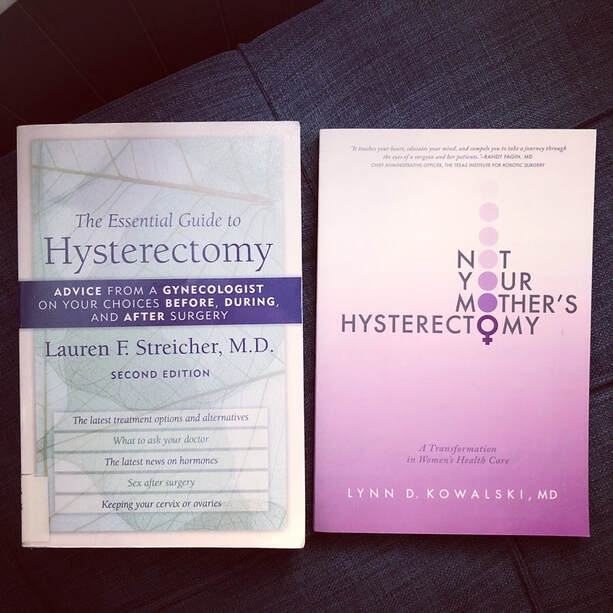|
Hysterectomy is among the top 10 most commonly performed surgeries in the US; 1 in 3 women has one by age 60. It seems like every other woman I’ve talked to has had one or knows a relative or friend who has one scheduled. It may be common but it’s still a major surgery that requires general anesthesia and significant recovery time. We’ve got to have a pre-op plan for optimal mental and physical health post-op. These are the things I am preparing in the two weeks leading up to my surgery date. The following tips are written with hysterectomy in mind but could potentially be applicable to other major surgical procedures. Mind prep Know what you are having done and don’t be afraid to ask ALL the questions or get a second opinion. Write your questions down and bring the list with you to any pre-op appointments. It’s surprising how many women scheduled for hysterectomy aren’t sure what exactly is being removed or the surgical method planned. This causes unnecessary anxiety and worry. That’s not acceptable; we need to be informed. Prior to this year, I honestly thought hysterectomy meant removal of all of the internal reproductive organs: uterus, cervix, tubes, and ovaries. I also incorrectly thought hysterectomy was guaranteed surgically-induced menopause. A hysterectomy refers to removal of the uterus only; often that includes the cervix, but not always. Fallopian tubes and ovaries may be removed as well. The ovaries, if healthy, can be left in women still several years away from menopause. The decision to remove these other organs is, of course, a matter of your diagnosis and a necessary discussion between you and your surgeon. But it’s important for you to have a strategy to manage menopausal symptoms should you need to have your ovaries removed or if you experience post-surgical premature ovarian failure. Loss of estrogen is a big deal so talk to your doc! The surgical method also matters. Back when my mom had her hysterectomy in the mid-1980s, the surgery was done with an open abdominal incision. Now, more surgeries are done via minimally invasive techniques. I read quite a bit of information online but found a couple of books the most useful: The Essential Guide to Hysterectomy by Lauren F. Streicher, MD and Not Your Mother’s Hysterectomy by Lynn D. Kowalski. These books were helpful in learning about the different methods available, questions to ask before surgery, and what to expect during recovery. I have a list of questions to bring with me to my pre-op consultation next week. It feels good to be prepared. It’s okay to have an odd mix of feelings leading up to your surgery date. Hope combined with dread. Relief. A sense of loss. It’s weird to feel sadness about losing an organ but from what I have read, it’s totally normal! Another significant source of feelings has to to do with childbearing. At 40 years old, I don't have children. I made the decision to remain child-free many years ago and I'm happy with that decision. Therefore, it was unexpected to have feelings come up about firmly closing that door. It’s comforting to know that other women often experience similar feelings. Anticipate challenges so you can mentally prepare and know what to do. It is neither healthy nor helpful to dwell on all of the “what ifs?” before surgery. However, it is important to think about inevitable challenges. It’s safe to say that post-surgery healing is going to be challenging even if it is the most textbook, non-complicated recovery ever! Consider the following questions: How will you handle not being able to do certain tasks post-surgery? What if it takes you a bit longer than anticipated to get back to your normal routine? How will important tasks get done and what can be left undone? How will family and/or pet responsibilities be handled? Who can help? Having a plan will save you from additional stress and anxiety while you heal. Expect to feel frustration and like you should be doing more. Anticipate how you will handle those feelings. I already know this will likely be the biggest challenge for me during recovery so I am developing strategies for dealing with it. I'll let you know how it goes in a few weeks! Consider your healthy habit anchors. Changes to your routine can be quite devastating to healthy habits; it is common for habits to slide or completely disappear. Surgery will definitely result in significant changes to your usual routine. You can continue many of your established healthy habits as long as you’re prepared! How will your new schedule include your already established habits? If they are tied to something you won’t be doing, what else can you tie them to? For example, if your pre-op habits include nutritious lunch preparation during your morning, how will you ensure that you continue to eat a nutritious lunch now that your morning routine isn’t the same? Is exercise and eating well tied together for you? How can you plan to eat well without the usual exercise component? Have a mental health plan. Post-operative depression is real yet it’s not often discussed. Even if the surgery went well and the physical body is healing as expected, depression is a complication that can arise. It is important to recognize the symptoms so you can seek help. Plan something fun and/or relaxing prior to surgery. It doesn’t have to be elaborate or expensive. Get out of the house. Eat good food with good people. Laugh at a comedy show. Escape for a bit at the theater. Take yoga classes. Do something to take your mind off of surgery, recovery, and the challenges that go along with it. So far, I’ve planned a girls’ dinner, a massage, and a date night with my husband. Home prep Of course, post-surgery means resting more and minimizing physical effort, especially for the first few weeks. In order to do this, it will be crucial to have your home in order prior to surgery. Use this checklist to help:
Here’s a list of items you may want:
Body prep Do what you can to maintain your health leading up to surgery (you know...aside from the health issues that led you to have surgery). Continue to engage in regular exercise including cardio and strength training. If you don’t already exercise and surgery is months or weeks away, you can start now and improve your body’s strength and resilience. Even adding body-weight and light resistance training twice a week is great! Continue or start a restorative yoga practice. A gentle, focused restorative practice can benefit the body in several ways including calming the nervous system which is probably hyped up due to stress. Speaking of stress, it is important to manage those stress levels. Try these tips:
Nourish your body. Focus on eating vegetables, fruits, whole grains, healthy fats, and lean protein and minimizing processed foods. I found this Precision Nutrition four part article on Nutrition for Injury Healing. I plan to refer to this to help me with my pre-op shopping lists and meal prep. This will also give me some guidance on talking to my doctor about supplements for after surgery. If you don’t already eat adequate fiber, start to slowly increase your intake. Establishing healthy bowel habits now will make them easier post-op. Having poo troubles is one of the most common hysterectomy post-op issues. We don’t want to be straining! Talk to your doctor about recommendations for gentle medications to have at home, just in case. Most of us don’t want to have surgery. We want to be healthier, feel better, and live well. Surgery happens to be one the of the means to get us there. The weeks leading up to it can be filled with a mix of anxiety, fear, sadness, and hope. Creating a pre-op plan can help you have a more positive, healthy post-op experience. Set yourself up for success and go into surgery with a prepared mind, home, and body. Here's to a healthy hysterectomy! Do you know someone who has one scheduled? Share this post with them. Better yet, get a printable checklist below! This checklist contains the information in this post in an easy three page format that you can print and share.
Stay tuned for posts on surgery updates, strength training guidance and more!
0 Comments
Leave a Reply. |
Archives
June 2023
Categories
All
|





 RSS Feed
RSS Feed